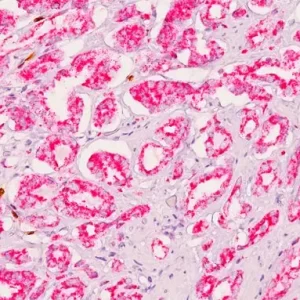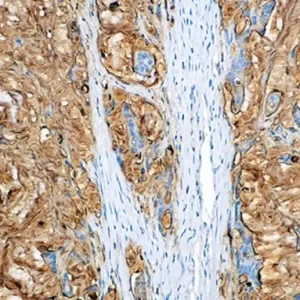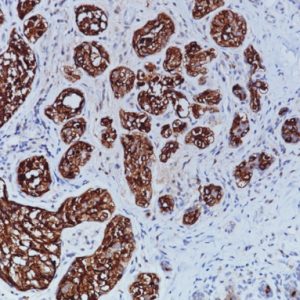Description
Tumor Associated Glycoprotein antibody [B72.3], also known as TAG-72, has the properties of a mucin. The majority of human adenocarcinomas including colorectal, pancreatic, gastric, ovarian, endometrial, mammary and non-small cell lung cancer display some cell populations that are positive for TAG-72 staining. Weak or no reactivity has been observed with most cell types of normal adult tissue with the exception of the secretory endometrium. Tumor Associated Glycoprotein [B72.3] is reportedly useful in distinguishing pulmonary adenocarcinomas from pleural mesotheliomas.
SPECIFICATIONS
Specifications
| WEIGHT | N/A |
|---|---|
| DIMENSIONS | N/A |
| INTENDED USE | IVD |
| SPECIES REACTIVITY | Human |
| SOURCE | Mouse Monoclonal |
| CLONE | B72.3 |
| ISOTYPE | IgG1 /kappa |
| ANTIGEN | TAG-72 or B72.3 |
| LOCALIZATION | Cell Surface and cytoplasmic |
| POSITIVE CONTROL | Colon carcinoma or breast cancer |
DATASHEETS & SDS
| Download Data Sheet |
| Download RUO Data Sheet for International |
| Download SDS Sheet |
Regulatory Notice: Biocare’s IVD-labeled products comply with US-FDA and European IVDD regulation. Other regions may have additional requirements for such labeling, please contact your local distributor.
REFERENCES
1. Van Niekerk CC, Vooijs P, Casparie-van Velsen IJ, Poels LG. Differentiation margins of ovarian tumor pathology: first incidences of epithelial ovarian tumors monitored by marker antibodies. Cancer Detect Prev 1997;21(3):247-257, 1997.
2. Guadagni F, Roselli M et al. TAG-72 expression and its role in the biological evaluation of human colorectal cancer. Anticancer Res, Jul;16(4B):2141-2148, 1996.
3. Center for Disease Control Manual. Guide: Safety Management, NO. CDC-22, Atlanta, GA. April 30, 1976 “Decontamination of Laboratory Sink Drains to Remove Azide Salts.”
4. National Committee for Clinical Laboratory Standards (NCCLS). Protection of laboratory workers from infectious diseases transmitted by blood and tissue; proposed guideline. Villanova, PA 1991;7(9). Order code M29-P.







Reviews
There are no reviews yet.